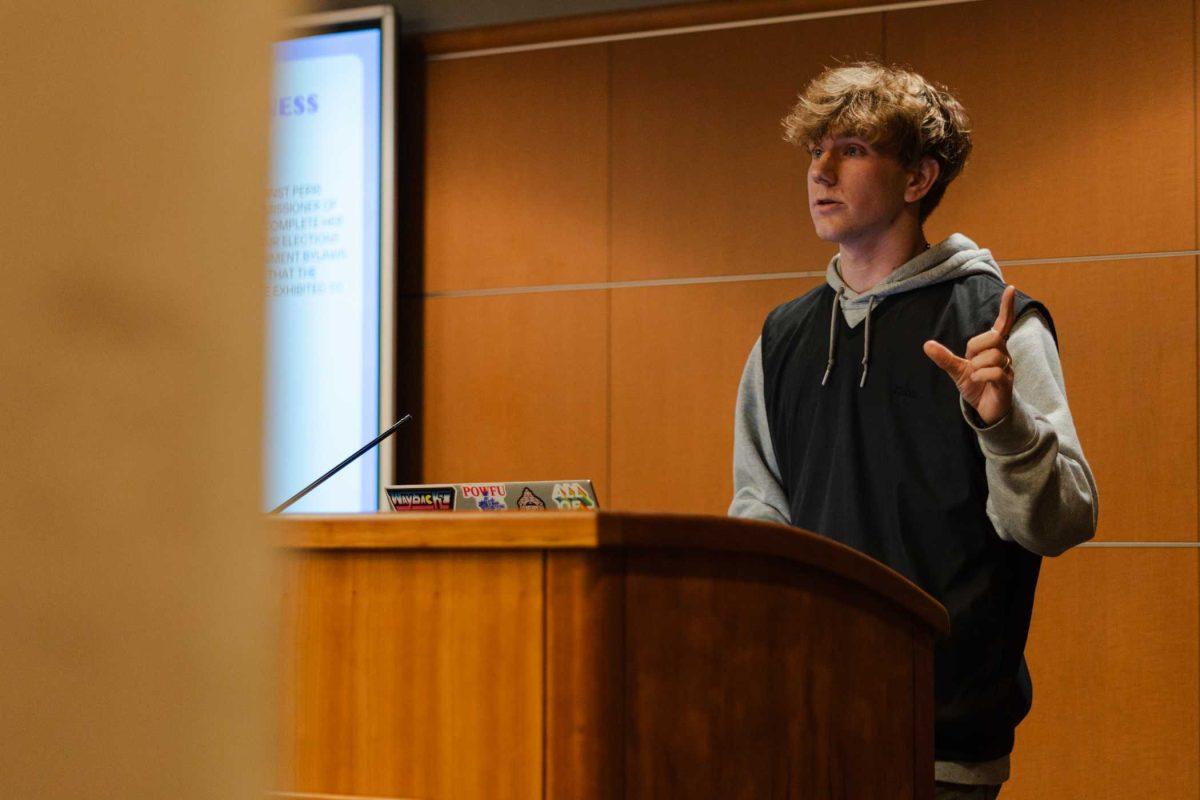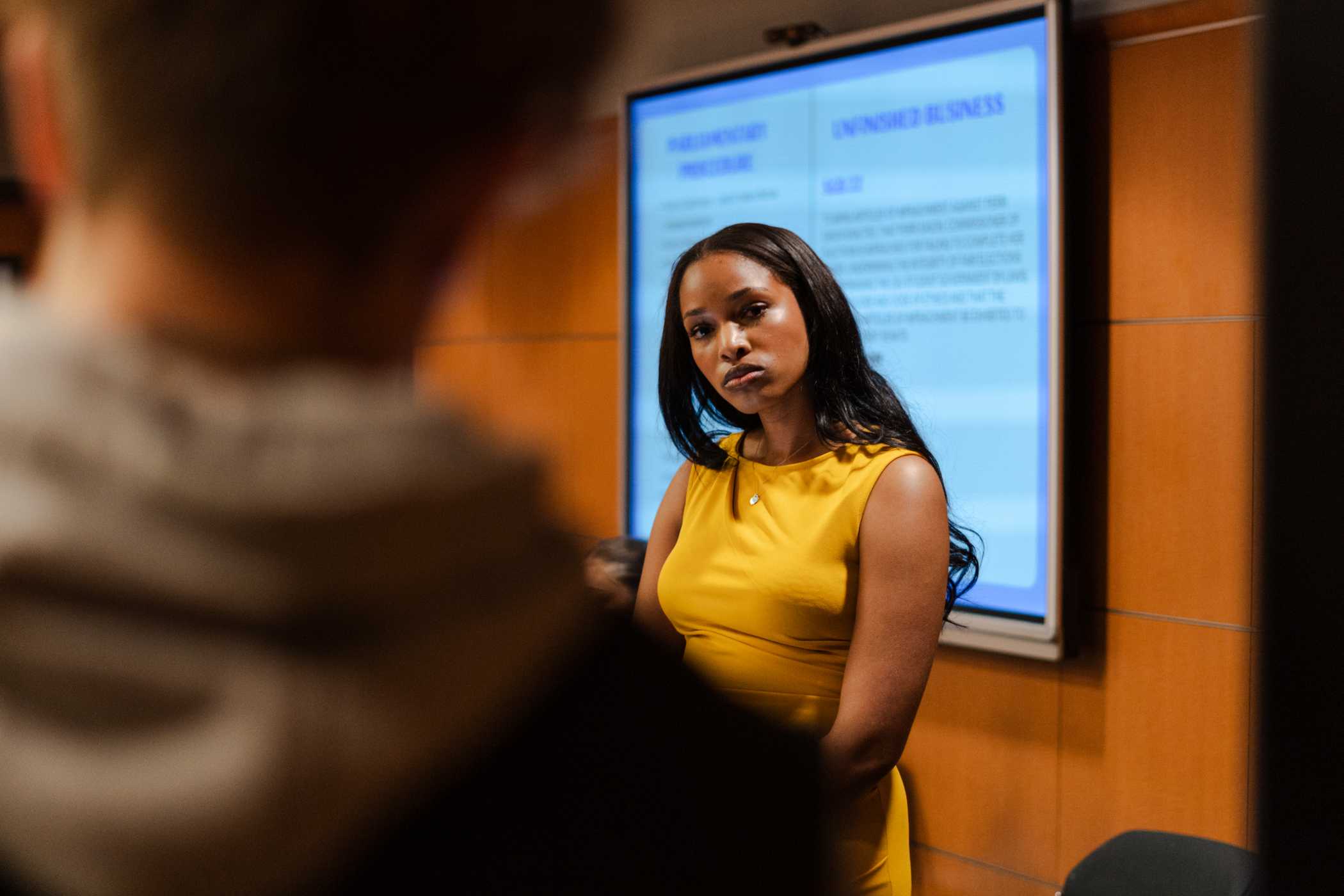Impeachment is rare in the Student Senate, but Wednesday night, it happened.
In a special session presided over by the chief justice of Student Government’s judicial branch, the Senate held a trial for the impeachment of Election Commission Chair Perri Eason. After presentations and questioning of Eason and Sen. Ethan Elmer, who co-authored the impeachment articles, the Senate voted 32-11 to remove Eason from her role.
The articles of impeachment said there was a “failure” on Eason’s part to properly publicize election information to candidates, students and voters, and they argued she had mishandled candidate applications and Election Commission meetings.
Eason said these claims were “baseless.” She pointed to the fact that many of the grievances against her were related to matters out of her hands. For instance, the verification of candidates is handled by student workers in the Office of Student Advocacy & Accountability; posting information to the website must be done through the university; and sending the email announcing voting is open is done by a third party.
In an interview with the Reveille after the Senate voted to remove her from office, Eason said she felt senators had already made their choice before hearing her case and evidence.
“Despite barriers placed in front of me, I remained poised and determined to do the job that former President [Lizzie] Shaw appointed me to do,” Eason told the Senate. “It is not only shocking, but also unfortunate that senators who have not taken time to get to know me, my character or my work would sign on to support baseless articles to impeach.”
Eason’s impeachment marks an infrequent occurrence in the Senate. The most recent instance came three years ago, when senators brought articles against then-Chair of the Election Commission Claire Parish, who resigned in response, saying she faced harassment from the Senate.
Before that, Reveille archives show the most recent mention of impeachment fell 10 years earlier when senators brought articles against both the University Court chief justice and a University Trial Court judge.
A bill for impeachment must be signed by 20% of the voting Senate, according to the LSU SG Constitution. This bill met that requirement exactly, with 12 signees out of 61 filled seats.
The signees included the following senators:
- Ethan K. Elmer – UCFY
- Lillian C. Bourgeois – College of Art and Design
- R. Corbitt Driskell – College of Business
- Kelsey R. Womack – UCFY
- Taylor J. Davlin – UCFY
- Mohamad E. Habib – College of Engineering
- Calvin W. Feldt – College of Engineering
- Gabriela A. Fontenot – College of Engineering
- An G. Tra – UCFY
- Alisha M. Ortolano – College of Agriculture
- Stephen J.W. Brower – College of Humanities and Social Sciences HSS
- Alicia Cerquote – Graduate School
The move came as a shock to Eason. She said that though Elmer had asked questions of her before, he had not brought these concerns to her. She first learned of those through the articles of impeachment.
Eason said she was asked to step down, and that she felt people expected her to do so.
“I don’t think anybody assumed that I would show up today, not only defend myself but defend myself well,” said Eason, who is also vice president of the Pre-Law Society. She said the hearing today, and the case she prepared in her defense, reaffirmed her desire to become a lawyer. Eason also noted she is one of the few Black chairs, and particularly one of few Black female chairs, to head the commission.
The day before the impeachment hearing, Eason was calm but determined. In an interview, she acknowledged the senators’ decision to bring articles of impeachment against her, saying that she had “respect” for their “right” to do so.
“Obviously, I don’t agree with it,” Eason said. “I have worked extremely hard in my position. All the work that I have done has not been easy, you know, it’s been a sacrifice.”
Both her personal and school schedule, Eason said, had been impacted by the time and effort she had put into managing the Election Commission.
Rather than resign, however, she resolved to fight.
“I stand by all the work that I’ve done, and I’m confident in my ability to defend myself,” Eason said.
Wednesday night, Both Eason and Elmer arrived early to Capital Chambers. Elmer roamed the room’s center, as Eason sat in the back, bent forward, closely studying her notes.
As the senators raised their right hands to take an oath, Eason sat stone-faced.
“I’m human,” she said after the hearing. “I do have emotions, but I feel like I wasn’t able to show those emotions today or else it would have probably been used against me.”
In his opening remarks, Elmer outlined the grievances that led him and his co-authors to pursue Perri Eason’s impeachment, saying she had “undermined the integrity of the election process.”
“It is our belief that the chair of the commission is not of the quality necessary to fulfill such a critical role in the Student Government and therefore shall be impeached,” Elmer said.
The bill containing Eason’s articles of impeachment said there were lapses in communication and procedure over the course of her tenure as chair.
The document said Eason announced erroneous election dates, failed to adequately communicate with candidates and publish important election documents, or if she did, the information provided often conflicted with other documents.
Elmer also later said he had exchanged as many as seven to eight emails back and forth with Eason on the topic of election matters.
Central to the articles of impeachment was the story of one candidate from the University Center for Freshman Year, who did not appear on the election ballot after failing verification because of a discrepancy with her college of origin.
The candidate, Abry Layrisson, filed for candidacy from the Manship School of Mass Communication but was still a member of the UCFY.
The articles of impeachment pointed at Eason for the verification issue. At the trial, however, Eason clarified that her role as chair was limited in this case, given it was the Office of Student Advocacy & Accountability’s job, not the Election Commission’s, to review and verify the information. In fact, Eason said she didn’t have access to the student information necessary to verify candidates, which contains sensitive details like grade-point averages and addresses.
The student worker who originally checked Layrisson for eligibility missed the clerical error in her filing.
“The mishandling of this case specifically led to an excited candidate for student government suddenly having all of that excitement taken and the opportunity to join us,” Elmer said.
Laryisson would be disqualified regardless, according to Eason, as she had misfiled after the preliminary filing date.
Other problems mentioned in the articles showed similar misunderstandings between the Election Commission, candidates and the Senate.
The articles of impeachment cited Title 6, Chapter 6, Section 509 of the SG Code, which explains that the Election Commission chair must publish the unofficial results of the general election three class days after the voting period closes in an appropriate campus location and online.
Eason did not post the unofficial results in a physical location within the three days but did submit them for upload to the SG website. Even so, the process to have documents posted on an official LSU website is lengthy, requiring weeks not days—a logistic outside of Eason’s control.
The Senate’s decision to impeach and remove her from office was also outside of her control. Still, standing outside Capital Chambers in the quiet hall, Eason didn’t feel she had truly lost.
“I do not think that this is the end of my impact at LSU,” Eason said. “I think this was just a stepping stone… sometimes people think that they’re doing something to you, they’re really doing something for you.”
See how your student senator voted in the searchable chart below.








